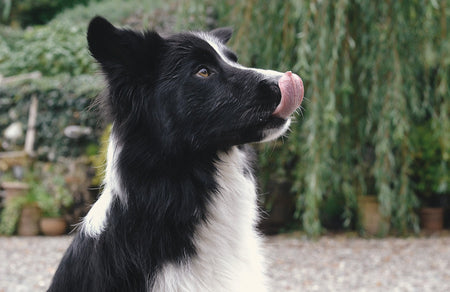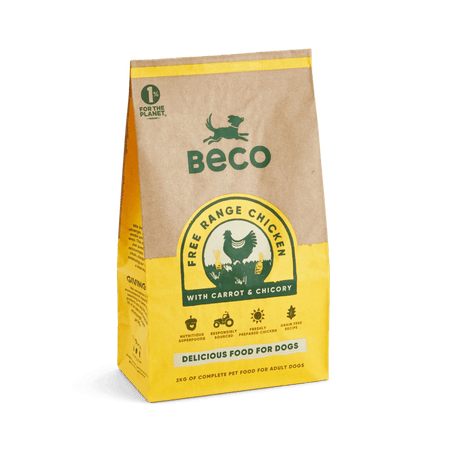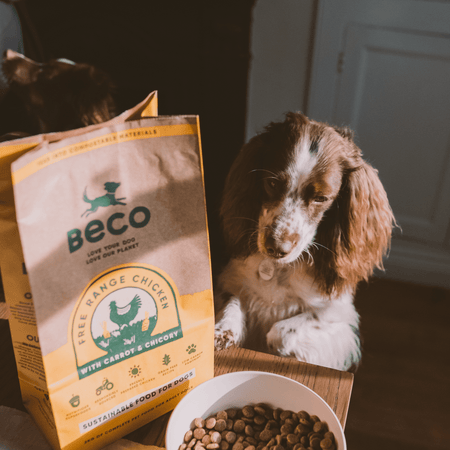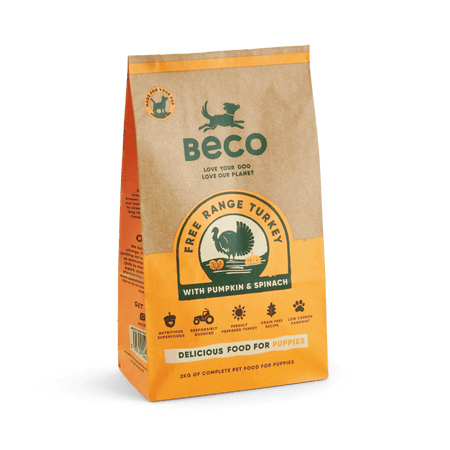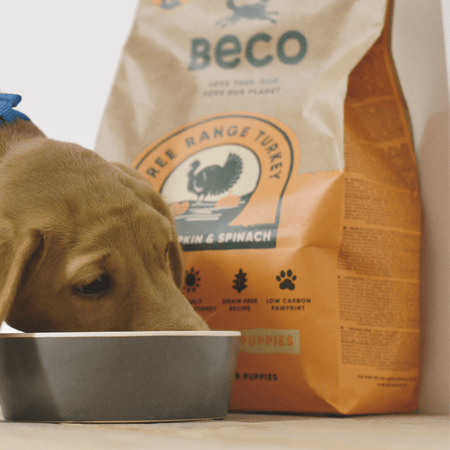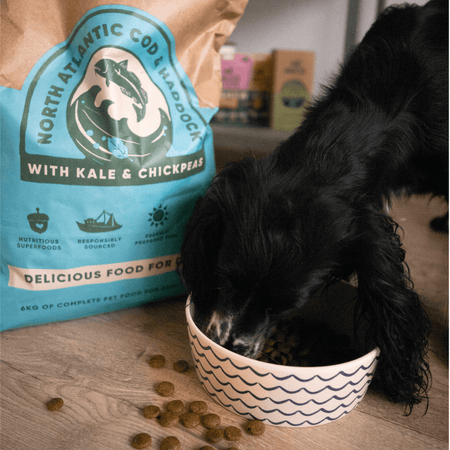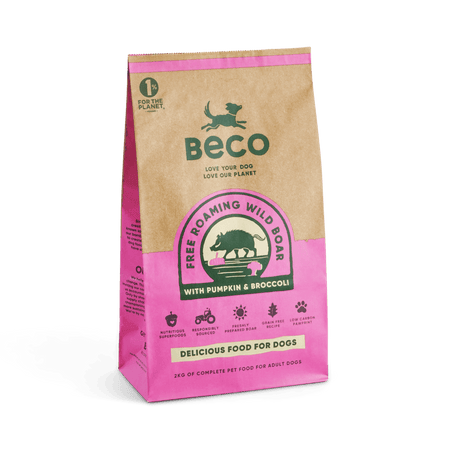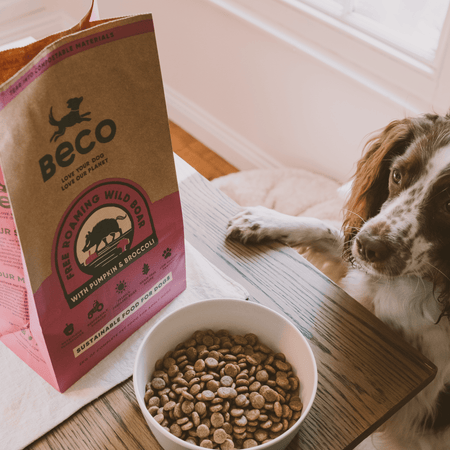If you're a dog owner, you might have wondered whether it's safe for your furry friend to eat pork. Most of us assume that pork is just like any other meat, so the odd bit of bacon or sausage is often given to our pet as a little treat. But is this the case? Should dogs eat pork, or will it hurt them? And what about dogs with sensitive stomachs - is pork safe for them?
This article will explore whether dogs can eat pork and what you should know before feeding it. We'll cover areas such as processed vs unprocessed pork, the benefits of pork for dogs, different types of pork, alternatives to pork, and much more. So let's dive in and discover whether pork is a good choice for your canine companion.
Here’s a quick summary if you’re short on time:
Key Notes
-
Dogs can eat pork, but you should be careful about what kind of pork you feed them, how it is prepared, and where it comes from.
-
Raw or undercooked pork is very dangerous for dogs, as it can expose them to parasites like Trichinella, so avoid it at all costs.
-
Pork can provide several benefits for dogs, including being an easily digestible protein source containing omega-3 fatty acids.
-
It's important to understand where your pork comes from; you don’t want to make your dog ill from eating poorly raised meat sources! Opt for pasture-raised pigs instead of factory farmed.
The Different Types of Pork
We'll look into these different types of pork as we discuss the health considerations for your dog.
-
Pasture-raised pigs thrive on pasture and are also known as pastured pigs. They typically feed on roots, plants, bugs and nuts. These pigs are generally healthier and happier as their movement is not restricted. They are also known to be more flavourful. Pork from these pigs can also be referred to as heritage pork.
-
Factory-Farmed Pigs - These pigs are primarily confined in pens. Their food typically depends on the farmers, but these pigs are vulnerable to illnesses even if they are fed wholesome grains and vegetables. As such, they are often put on antibiotics and dewormers.
Understanding where your pork comes from enables you to get the best quality if you incorporate pork into your dog’s diet.
If you’re wondering, ‘is pork good for dogs?’ it’s not necessarily sour for your dog. Instead, you need to be cautious of the type of pork you feed your dog, how it is prepared, and where you've sourced it.
Now, look at some key considerations before feeding pork to your dog.
Is Pork Bad For Dogs?
As a protein source, pork is generally considered safe for dogs.
However, pork comes in all different forms, including bacon, ham, gammon and sausage. This makes it difficult to say a definite yes or no to whether pork is bad for dogs and whether dogs should eat pork.
Processed pork varieties, like bacon, can contain high salt and fat levels, meaning they're not particularly healthy and are better left entirely off any doggy menu. In contrast, leaner cuts of pork, such as pork loin, are positively suitable for dogs and very nutritious.
Feeding your dog the proper cut of pork is a great way to help them reach the recommended amount of protein in their diet.
Unlike their wolf ancestors, dogs are not carnivores but omnivores, having evolved to digest meat and starches. Despite these evolutionary changes, protein remains an absolutely essential part of their diet and plays a vital role in things like healthy bone formation and maintenance. Without enough protein, dogs can develop weak and brittle bones.
Aside from more muscular bones, some of the advantages of pork include:
-
It’s an easily digestible protein source.
-
It's a source of Omega 3, which is excellent for their skin and joint health. Heritage pork, in particular, is higher in Omega 3 by 18-43% than other pork sources.
-
It has an excellent amino acid profile. Amino acids are essential for a dog's body to function correctly.
-
Pork organs, such as the liver and heart, provide essential vitamins and minerals.
-
It's a source of Omega 3, which is excellent for their skin and joint health. Heritage pork, in particular, is higher in Omega 3 by 18-43% than other pork sources.
-
It has an excellent amino acid profile. Amino acids are essential for a dog's body to function correctly.
Pork organs, such as the liver and heart, provide essential vitamins and minerals.
Is Uncooked Pork Bad For Dogs?
Raw or undercooked pork is very dangerous for both you and your dog. You should not risk feeding your dog uncooked pork as it exposes him or her to parasites such as Trichinella. Trichinella is a parasite found in raw meat and especially pork. If your dog consumes raw pork and you notice symptoms such as:
-
Vomiting
-
Diarrhoea
-
Stiffness
-
Fever
-
Signs of stomach pain
You should consider getting in touch with your vet as soon as you can to avoid further complications.
You might be wondering about the pork in raw dog food. This kind of pork is safe for your dog as it has undergone extensive treatment, such as freezing, to ensure there is no risk of contamination or nasty parasites.
Processed Pork For Dogs
If you don't want to avoid processed pork altogether and decide to spoil your furry friend with the occasional sliver of sausage, practice a high level of moderation.
If your dog has health problems, issues with fatty foods, or a sensitive digestive system, do not attempt to feed him or her this processed food.
- These processed forms of pork are likely to contain ingredients that could lead to serious digestive issues, especially if they have a sensitive stomach.
- Some forms of pork might be toxic for your dog or even lead to long-term allergies or intolerances.
- Pork-based meats such as bacon and ham are highly processed, and humans are advised to consume them in moderation. Your canine friend will likely give you pleading eyes whenever you are sizzling up some bacon, but try to avoid giving in.
- As mouthwatering, flavourful and aromatic bacon or ham is, it still contains plenty of unhealthy fats and excess salt, which will only do damage as your dog’s stomach struggles to digest it.
- The excess fats could also lead to health conditions such as heart disease or dog pancreatitis. Pancreatitis is a condition where digestive enzymes in the pancreas are activated too soon, leading to ‘self-digestion’ of the pancreas.
If you don't want to avoid processed pork altogether and decide to spoil your furry friend with the occasional sliver of sausage, practice a high level of moderation.
If your dog has health problems, issues with fatty foods, or a sensitive digestive system, do not attempt to feed him or her this processed food.
Can Dogs Eat Cooked Pork?
Pork is a good source of protein and other essential nutrients that dogs need to maintain good health. However, dogs can have trouble digesting fatty meats, such as pork, which can lead to gastrointestinal upset.
Can Dogs Eat Pork Chops?
When it comes to pork chops, they are not recommended for dogs because they are often cooked with seasonings and oils that can be harmful to them.
Can Dogs Eat Pork Mince?
On the other hand, pork mince can be a good choice for dogs if cooked thoroughly and served in moderation. As with any food, it is essential to introduce pork slowly and watch for any adverse reactions in your dog.
Can Dogs Eat Pork Bones?
Before you throw your dog a (pork) bone, it is essential to know that pork bones are very brittle when cooked and can easily break or splinter. They, therefore, pose a choking hazard and can cause tears in your dog’s gut if swallowed.
Instead of a pork bone, if your dog needs a good chew, consider getting them a dog toy such as hemp rope instead. Hemp rope is a safer, more durable, and eco-friendly option.
Are There Alternatives To Pork?
As most pet parents feed their dogs beef and chicken, pork is considered a "novel protein". As the name suggests, a novel protein is a protein your dog does not usually eat, making it less likely to cause adverse reactions.
This may make pork a good option for dogs with specific protein allergies - although, if your dog has allergies, it's best to consult your vet before changing their diet.
Not keen to feed your dog pork? The closest alternative to pork is wild boar.
Like pork, wild boar is also a novel protein source making it one of the best options for dogs with allergies or intolerances.
Wild boar has the advantage over pork because:
-
It is considerably leaner meat (wild boar moves around a lot more).
-
When served alone as a single source of protein, it's straightforward for dogs to digest.
-
Wild boar can roam free and forage for grass, roots, and seeds, unlike most pigs. As such, no processed farm feeds are involved in raising boar, eliminating the need for antibiotics/treatments.
At Beco, we are big on treating your dog well while simultaneously loving the planet, so we use wild boar in some of our products.
Not only does wild boar have the health benefits listed above, its foraged diet means it has a low impact on the environment. This makes it a healthy and eco-friendly alternative to traditional animal food sources.
How Should I Prepare Pork For My Dog?
Still, want to try feeding your dog pork? Here are our best practices for feeding dogs pork:
-
Ensure your vet approves and your dog hasn’t a history of pork sensitivity (more on this in a bit).
-
Heritage pork from pastured pigs has more nutritional value, so opt for this where possible.
-
Choose lean cuts of pork with no bones and strip away most of the fat. Although it might seem unpalatable to humans, some parts of the pig your furry friend might enjoy are the (nutrient-dense) heart, liver, tongue and trachea.
-
Take care when preparing the pork. The pork should be simple, so avoid seasoning the meat with condiments or spices. Avoid vegetables such as onions or garlic since they can harm your dog.
Is Pork Ok For Dogs With A Sensitive Stomach?

Pork can be suitable for dogs with sensitive stomachs, but it all depends on the leanness of the cuts.
Opting for lean pork cuts as high fat and a sensitive stomach might not be a good mix. Processed pork, such as bacon or ham, is definite "No!" for dogs with this condition. That's because these processed forms of pork contain high fat, salt and other ingredients, which might not be the best for your dog with a sensitive stomach.
If you are cooking pork for a canine with a sensitive stomach, it is essential to ensure that on top of the meat being lean, it should have no additives, extra ingredients or condiments. You might find it bland but best believe your dog will happily gobble the meal up without the risk of a nervous stomach.
Finally, be sure to consult your vet before feeding pork to your dog with a sensitive stomach.
Final Thoughts - Can Dogs Have Pork?
If you are preparing pork for your dog at home, it's important to remember to keep it simple and plain and avoid potentially dangerous additions. For the most part, avoid feeding your dog processed pork: excessive salt and fat are unsuitable for your dog's digestive system or overall health.
You should also resist giving your dog pork bones as a chew toy: cooked pork bones break easily and pose a choking hazard. Remember, wild boar is an excellent choice for those wanting an alternative to pork. It is just as flavourful as pork but is a novel protein (making it less likely to lead to allergies), is lower in fat and cholesterol, and is better for the environment.
